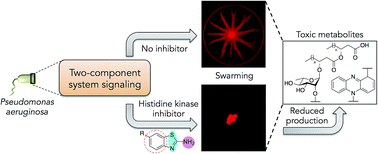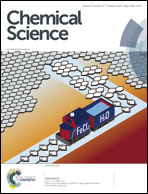Disarming the virulence arsenal of Pseudomonas aeruginosa by blocking two-component system signaling†
Abstract
Pseudomonas aeruginosa infections have reached a “critical” threat status making novel therapeutic approaches required. Inhibiting key signaling enzymes known as the histidine kinases (HKs), which are heavily involved with its pathogenicity, has been postulated to be an effective new strategy for treatment. Herein, we demonstrate the potential of this approach with benzothiazole-based HK inhibitors that perturb multiple virulence pathways in the burn wound P. aeruginosa isolate, PA14. Specifically, our compounds significantly reduce the level of toxic metabolites generated by this organism that are involved in quorum-sensing and redox-balancing mechanisms. They also decrease the ability of this organism to swarm and attach to surfaces, likely by influencing their motility appendages. Quantitative transcription analysis of inhibitor-treated cultures showed substantial perturbations to multiple pathways including expression of response regulator GacA, the cognate partner of the “super regulator” of virulence, HK GacS, as well as flagella and pili formation. These promising results establish that blocking of bacterial signaling in P. aeruginosa has dramatic consequences on virulence behaviours, especially in the context of surface-associated infections.

- This article is part of the themed collection: 2018 Chemical Science HOT Article Collection


 Please wait while we load your content...
Please wait while we load your content...